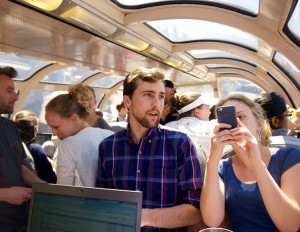
“Millennial” travelers — those between 18 and 30 years old — have sharply different business and leisure travel habits and expectations than do their older peers, according to a global study by Expedia.com and Egencia.
The Future of Travel study was conducted across five continents, asking 8,535 employed adults in 24 countries about how they conduct business and leisure travel — their likes, dislikes, preferences and pet peeves. The study sought to discover how millennials impact the travel landscape now and in the future, as they gain decision-making power at work and purchase power in their personal lives.
 Not surprisingly, the study found sharp differences emerging in the ways younger travelers value loyalty and branding when using varying mobile platforms. For instance, millennials are more likely to embrace loyalty programs while en route; half of those millennials surveyed looked at loyalty programs when booking flights (48%) or hotels (51%), versus only three in ten of travelers aged 46-65 (31% / 30% respectively).
Not surprisingly, the study found sharp differences emerging in the ways younger travelers value loyalty and branding when using varying mobile platforms. For instance, millennials are more likely to embrace loyalty programs while en route; half of those millennials surveyed looked at loyalty programs when booking flights (48%) or hotels (51%), versus only three in ten of travelers aged 46-65 (31% / 30% respectively).
In booking business travel, 32% of those 30 and under reported using a smartphone and 20% reported booking on a tablet. That’s compared to just 12% for smartphone and 9% for tablet for those over 45. And 18-30 year-olds are far likelier than 46-65 year-olds to use mobile devices to enhance their travel experience.
Free-Spending Millennials. Globally, business travelers aged 18-30 report more frequently that they will spend more of their company’s money on high-end meals (42%) than they would their own money (compared to those aged 46-65 (26%)). Millennials are also fans of room service: 37% would spend more of their company’s money on room service, versus only 21% of 46-65 year-olds.
Younger Americans (34 and under) are slightly more likely to spend company money on a flight upgrade to business- or first-class than are their older peers (35 and older). They are also slightly more likely to spend company money on high-end meals, room service and wine/alcohol, although not significant.
Frequent Travelers. Worldwide, 30-and-under report traveling 4.7 times per year on business, versus 3.6 times per year among 30-45 year-olds, and 4.2 times per year among 46-65 year-olds. Millennials take more leisure trips as well, at 4.2 trips a year, versus 2.9 for 31-45 year-olds and 3.2 for 46-65 year-olds.
Among Americans, 45% of respondents aged 34 and younger claim to work fewer hours when they travel than they do at the office, versus 24% of Americans aged 35 and older.
American and Canadian millennials travel more frequently of any age group across any nation, reporting that they take a full 7.8 leisure trips per year. On the contrary, European respondents aged 31-45 take 2.7 leisure trips per year.
“Business travelers are early adopters of technology — millennial travelers even faster — and all on the move from device-to-device, from online to offline and back again,” said Rob Greyber, president of Egencia. “We realize that keeping pace with millennials and future generations of corporate travelers demands significant focus on mobile in order to sustainably engage them with the right information.”
On the whole, the study found that:
- Millennials are more comfortable mixing business with pleasure. They are more likely to extend a business trip into a personal vacation than older employees are. 62% of 18-30 year olds have done so, vs. 51% of 31-45 year olds and 37% of 46-65 year olds. Younger Americans and Canadians are more likely to do this (70%), than those age 31-45 (50%) or 46+ (31%).
- Working more hours? 39% of all business travelers report that they work more hours when they travel than they do at the office. Europeans (45%) are more likely than Asia-Pacific (35%) and North American (32%) travelers to say that they work more hours than normal when traveling.
- Millennials are also more likely to voice their displeasure. The18-30 year old business traveler sector are likeliest to post a negative review online, or make complaints relating to their experience with hotels, restaurants, flights, public transportation, taxis and rental cars. Negative reviews are still relatively rare, however; 67% of travelers worldwide have never done so. Reviews themselves are considered highly important for both business and leisure travel, particularly among millennials. Nearly 80 percent of these18-30 year olds worldwide consider travel reviews to be “very important” or “somewhat important.” This sentiment holds true across a majority of all age groups and regions.
- Mobile devices cross all demographics. Mobile devices are nearing ubiquity for business travelers across all regions and all demographics, but more so for millennials than any other group, unsurprisingly. 75% of travelers surveyed worldwide use smartphones and tablets for both personal and business reasons when traveling.
- Location, location, location. Where the place is matters over everything when business travelers book hotels, with travelers most frequently citing it as the most important feature (53%). The price of the hotel room (44%) narrowly edged out travel time to the city in question (42%) as next most-important features. Airfare price, at 36%, ranked fourth. In-flight Wi-Fi was not a high priority among business travelers worldwide, though in every region, the importance of in-flight Wi-Fi declines as travelers aged.
- For leisure travelers, hotel room price ranks among the top three most important features. Hotel location and air fare price are the other top features of focus. On-board Wi-Fi turns out to be less important for leisure travelers than for business travelers, across all age groups and regions, according to the survey.
- When traveling on business, 83% of respondents worldwide feel that they should be personally entitled to travel reward points. Globally, workers under the age of 45 surveyed tend to feel more entitled to their points than older employees.
- A majority (68%) of employees are compensated for their business trips on nights and weekends. Across all regions surveyed, 18-30 year olds are more likely to be compensated with either money or added vacation time (78%).
Survey Methodology : This Expedia survey was conducted online from August 20, 2013 to September 12, 2013 across Europe, North America, South America and Asia Pacific by Harris Interactive among 8,535 respondents over the age of 18. Respondents had to prove full time, part time or self-employment to qualify.
Similar stories:
Ten Best Travel Apps for 2013
Travel 2012: What, Who are the Influencers?

































































































































































































































































































Get Social